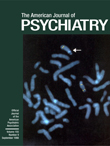Summer Birth and the Deficit Syndrome of Schizophrenia
Abstract
Objective: Patients with the deficit syndrome differ from other patients with schizophrenia relative to physiological correlates, course of illness, and response to treatment. Because of the abnormal seasonality of birth among persons with schizophrenia, the authors examined the relation between this risk factor and the deficit syndrome.Method: Findings in two clinical groups suggested an increase in summer births among deficit syndrome patients. The association between summer birth and the deficit syndrome was then examined in a catchment area study of first-admission patients with psychosis.Results: In the catchment area sample, summer birth was also significantly associated with the deficit syndrome; negative symptoms broadly defined were not. Conclusions: These findings add to the increasing evidence that 1) patients with the deficit syndrome have a disease with an etiopathophysiology separate from that of other patients with what is now called schizophrenia and 2) the correlates of broadly defined negative symptoms are different from those for the deficit syndrome. The previously reported association between winter birth and schizophrenia appears to apply to nondeficit schizophrenia only. Am J Psychiatry 1998; 155: 1221-1226



